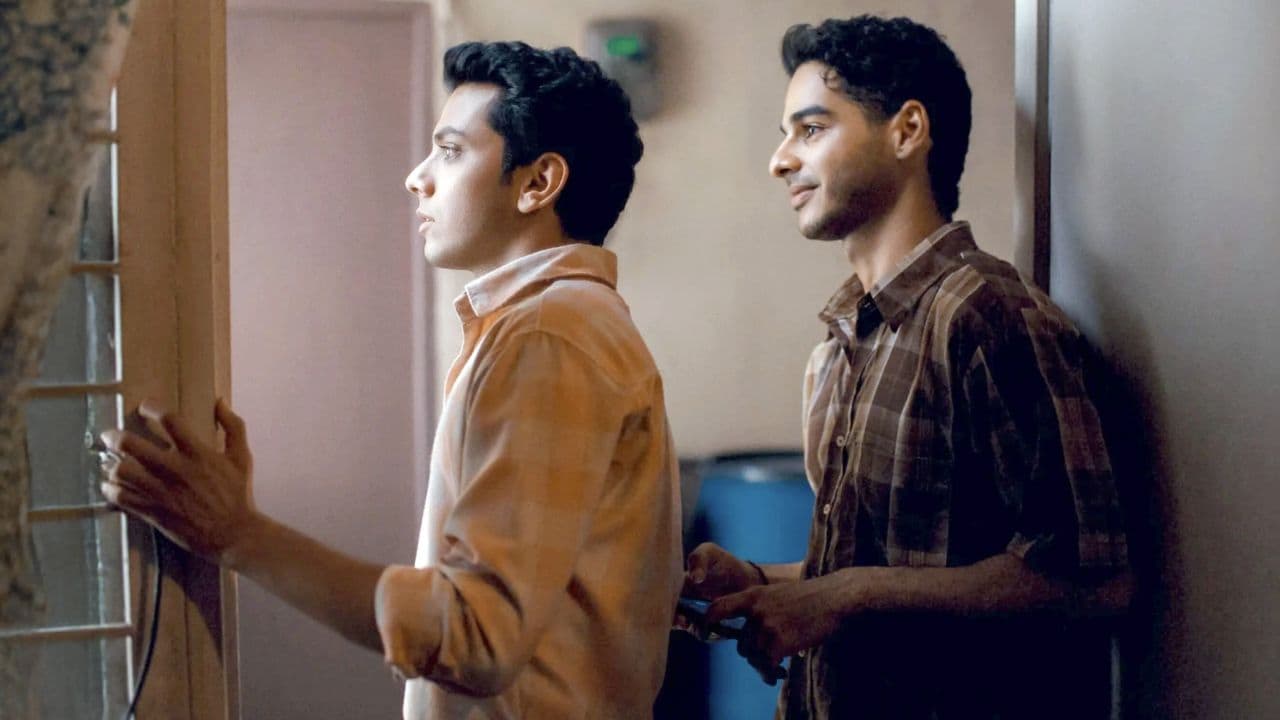Neeraj Ghaywan’s sophomore feature-length directorial seems like the obvious choice to represent India at the fabled Oscars. The story of two childhood friends, impoverished and marginalised because of their identity—one’s a Dalit, the other Muslim—and the resultant casual cruelty, Homebound premiered at the Cannes Film Festival earlier this year to a resounding nine-minute standing ovation.

Despite a modest release in Indian theatres, the 120-minute film has a lot going for it. Rave critical appreciation in the festival circuit and here at home, enough star power to attract and sustain attention (Ishaan Khatter, Vishal Jethwa, Janhvi Kapoor) and the backing of a studio (Karan Johar’s Dharma Productions) that has the long legs needed to run the Oscar race. Not to forget the big Hollywood names of Martin Scorsese and Malita Toscan attached as executive producers.
Moreover, like Payal Kapadia’s 2024 runaway indie debut All We Imagine As Light, Homebound looks and feels like it’s been made with Western audiences in mind. The film has quite a few strategic expository scenes and dialogues that try to lay bare the layered complexities and complicities of caste, religion, and gender as they play out in the hinterland grassroots for those unfamiliar.
Also Read: PVR INOX to celebrate Shah Rukh Khan’s birthday with a special film festival—Here’s the full lineup
Despite its tense, thorny themes, at no point does the film throb with raw rage. Whether it be helplessness, injustice, or the suffocation that stems from hitting one dead end after another, Homebound uses restraint as its language to communicate emotions as volcanic as turmoil, ambition, envy and abject dejection.
Unlike Dhadak 2, another Dharma film (released in August this year) that looked at caste hegemony in the eye and didn’t hold back its anger at the claustrophobic oppressiveness of it all, Homebound uses silence to choke. Inspired by Basharat Peer’s 2020 New York Times essay that recounted the halting grief of two friends forced to walk from Surat to their Uttar Pradesh village about a thousand kilometres away after the ill-conceived first lockdown was announced at the advent of the coronavirus outbreak, the film zooms in on the gut-wrenching apathy that shrouded the migrant crisis.
However, Dhadak 2 throws blood at you right at the start, making you distinctly aware of what you’re in for. But Homebound is so intricately, inextricably mired in the marginalised disenfranchisement of its protagonists in the first half that you don’t see the migrant crisis coming. It creeps up on you (and the two boys) out of nowhere and then hits like a million bricks.
Ghaywan, along with co-writers Sumit Roy, Varun Grover and Shreedhar Dubey, does a terrific job of conveying the uncertainty that marked the first COVID-19 lockdown. Just like millions of people across the country at the time, Shoaib (Ishaan Khatter) and Chandan (Vishal Jethwa) too had no way of pre-empting or grasping the gravity of the calamity that awaited them.
Also Read: Sonakshi Sinha, Sudheer Babu, and Shilpa Shirodkar's 'Jatadhara' trailer unveiled
Ever since his blistering directorial debut a decade ago with Masaan, Ghaywan has established himself as a key voice of the marginalised in Hindi cinema. Along with the two full-length features, in the last 10 years, he’s also directed short films Juice (2017) and Geeli Pucchi (2021). As sharp and incisive as a butcher’s knife, they cut deep to reveal how caste, gender, and sexual orientation are used as social handicaps to intentionally disable certain people so that power continues to stay with the entitled few.
But even amid all the ache and sadness, Ghaywan and cinematographer Pratik Shah manage to create scattershot snapshots of beauty and hope. The riverside where Shoaib and Chandan meet often to unwind becomes a symbol of their tumultuous relationship. The river ebbs and flows in tune with their friendship. The boys’ love for cricket and Chandan’s fondness for biryani, seemingly benign at first, gain greater gravitas as the two continue to plod along against all odds.
Pratik Shah’s imagery is poetic, crafted with the intent to sear in your memory. Whether it be the visual of a group of migrant workers walking on an unevenly lit road at night with the world around them an obscure nothingness or that of a veiled woman offering water to two parched travelers when no one else would or Chandan’s mother showing off her cracked feet with pride as if it were a badge of honor or one friend carrying another on his back as he struggles to hold on to dear life with no help in sight, Homebound will stay with you and quietly resurface in the recesses of your consciousness the way Masaan does sometimes even today and will continue to.
/images/ppid_59c68470-image-176088253133398376.webp)

/images/ppid_a911dc6a-image-177060459050716255.webp)

/images/ppid_a911dc6a-image-177060455956770448.webp)
/images/ppid_a911dc6a-image-177060462277396524.webp)
/images/ppid_a911dc6a-image-177060452840148590.webp)
/images/ppid_59c68470-image-177060259326629403.webp)
/images/ppid_a911dc6a-image-177060263618562382.webp)
/images/ppid_59c68470-image-177060263036020993.webp)
/images/ppid_59c68470-image-177060256415162911.webp)
/images/ppid_59c68470-image-177060253296527544.webp)
/images/ppid_59c68470-image-177060253692789488.webp)